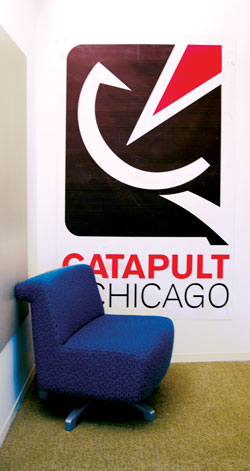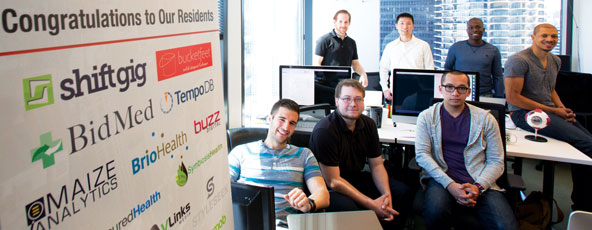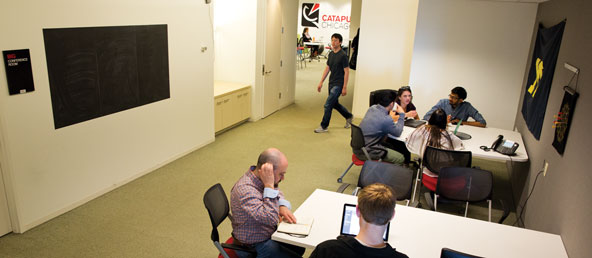Law firms are sponsoring incubators, cozying up with young entrepreneurs

Foley & Lardner’s Chicago offices photographed by Wayne Slezak.
On the 25th floor of the high-rise where Foley & Lardner has its Chicago offices, some of the city’s most promising high-tech startup companies have set up shop in a space the firm set aside just for them.
The companies include an e-commerce site for fashion, an online learning company, a promotions company and a company that provides evaluations of medical devices—all of which have, and likely will continue to have, a host of legal needs. If someone has a question or needs some legal documents, Foley’s lawyers are just a few floors up or a phone call away.
For Foley, having these startups nearby is a way to build long-term, mutually beneficial relationships in a market where young companies might become the next big thing—as well as the next big client.
Hoping to boost its presence in the startup market, Foley helped create a nonprofit incubator called Catapult Chicago. The idea was to help startups that have already gained traction take the next step by providing office space and access to lawyers, as well as fellow entrepreneurs and others who can help their businesses grow.
Catapult provides more than 10,000 square feet of discounted office space and a collaborative work environment for a group of carefully selected entrepreneurs. “There was no space for those wanting to get more serious. So we said, ‘Hey, maybe there’s something we can do,’ ” says Galen Mason, a Foley senior counsel. ” ‘How can we develop a mutually beneficial relationship that could help bring in future clients and invest in their businesses as well?’ “
Catapult is a hybrid business incubator and accelerator. As an incubator, it supports startups by providing resources such as office space, professional services, mentors, meeting spaces and business advice for a fee. Accelerators are considered the next step for startups that show promise and are ready to move forward with investors. At Foley, Catapult allows its resident companies to draw advice and expertise from one another and from sponsors such as Foley & Lardner and its lawyers around the country. The lawyers hold regular office hours for Catapult residents and open up their professional networks.
Foley also offers the startups various deferred and fixed-fee arrangements at its regular rates, as well as an ongoing relationship and access to its attorneys. “Law is a relationship business,” Mason says. “You have to trust the lawyer you work with.”
LOOKING FOR THE NEXT BIG THING
Reaching out to potential clients in the startup sector is something law firms across the country are doing with vigor. Many firms are on the lookout for clients that could wind up with multimillion-dollar IPOs and mountains of future legal needs. “If you do well, we do well,” Mason says.
On the West Coast, where the high-tech startup boom began, firms that were on the ground floor with startup clients continue to look for ways to stay competitive as more firms seek a piece of the action in this crowded field.
In San Francisco, which has become an extension of Silicon Valley, the Palo Alto-based firm Wilson Sonsini Goodrich & Rosati set up an office on the first floor of an industrial building in the city’s SoMa district, south of Market Street, an area to which many startups and young companies are flocking. The firm provides work and meeting spaces for its clients and hosts seminars, small-group sessions, one-on-one coaching and networking opportunities.
Yoichiro “Yokum” Taku, a Wilson Sonsini partner who works at the SoMa office, says the firm’s presence goes a long way toward fostering and cementing relationships. “It makes a lot of sense,” he says, “for us to be closer to where our clients are.”
The offices have the raw look of a startup environment, with exposed brick walls, large windows and an open space with conference tables and small, private rooms. “It gives it an interesting vibe as opposed to ‘Hey, we’re a white-shoe, Wall Street law firm where people wear suits,’ ” says Taku, who represents many early-stage companies and writes a blog called Startup Company Lawyer.
The setup also encourages interaction. “We have an open area and big tables that are used as a co-working space,” Taku says, “so we have some clients and people in the startup community just kind of hanging out there. Part of the point is to be part of the community.”
Being part of the community can pay off. “It’s very easy to wander by and stop at our office or meet in one of the area coffee shops,” Taku says. “There is a lot of serendipity that happens. I suspect that if I hit a golf ball in any direction from our office I have a chance of hitting a whole bunch of my clients who are around that space.”
The partners at Wilson Sonsini also have a venture fund from which they often make small investments in some of the startups they work with. “Hopefully they become the next Google,” Taku says. “It’s been great for the firm in getting to be closer to the SoMa startup community, and also for us in picking up new clients.”
Foley has similar aspirations. Mason, whose background is in employee benefits and executive compensation, has long been interested in working with the startup community. “One of Foley’s goals is strengthening the variety of clients that we have,” he says. “We want a breadth, and have startups as well as big companies.”
A couple of years ago, Mason teamed up with Foley partner Christopher Cain, along with senior management and entrepreneurs Ryan Leavitt, Vishal Shah and Kris Chinisorn, to create Catapult Chicago. Foley had unused office space it was leasing and decided to use it for this new venture.
Foley and other sponsors subsidize the rent, which allows companies to get premier space at below-market rates. Private offices for three or four people go for $900 a month and larger offices for $1,800. The price includes utilities, Wi-Fi, printing, conference rooms, open space for meetings and events, and the use of a gym in the building.
One of the businesses that has taken up residence at Catapult is ProcuredHealth. The company provides data and research on medical devices to help customers find the best and most cost-efficient products. To do that, the company needs access to federal documents that evaluate these supplies and are vital in helping its customers make smart choices. That’s where Foley & Lardner’s lawyers come in.
Foley’s lawyers have helped the company by making Freedom of Information Act requests to the Food and Drug Administration for its reports of products and devices, which then can be used by health-care providers when evaluating what to buy.
“Foley’s legal assistance has been instrumental in building our company,” says Hani Elias, one of the founders of ProcuredHealth. “They’ve helped us structure customer agreements, protect our brand, and secure FDA information that has been incredibly useful in developing our offering.”
Mason says the legal team helps empower these startups. “I’m really interested in seeing their business go crazy,” he says. “If you think about it, they would be a great client. They’re raising capital; they’re doing well. All of a sudden, you’ve empowered a small firm with big legal talent.”
Leavitt, co-founder and president of Catapult and vice president of business development for VLinksMedia, a Catapult resident company, says having the experience of a big firm such as Foley at his disposal makes it worthwhile.
“They have Fortune 500-level lawyers working for them,” he says. “Accessibility is very important, and we can trust the attorneys at Foley. If we’re raising capital, for example, we know the right person to go to.”

Photo of the Catapult Chicago team by Wayne Slezak
VENTURING INTO NEW TERRITORY
Like Wilson Sonsini, Foley also invests in some of the companies, Mason says. The firm created Foley Ventures, a $4 million venture fund made up from partner contributions and used exclusively for clients. Foley has invested in several Catapult resident companies already.
Investing in clients is not a novel concept, but it requires firms to be cautious about these relationships. Andrew Perlman, a professor of law and director of the Institute on Law Practice Technology and Innovation at Suffolk University Law School in Boston, says the idea of lawyers taking equity stakes in their clients goes back to the late ’90s and early 2000s, during the nascent years of the dot-com and tech business boom.
“There are potential conflicts of interest,” Perlman says. “The lawyer’s advice is not necessarily objective. Lawyers need to be careful and committed to following the letter of the law.”
In 2000, the ABA’s Standing Committee on Ethics and Professional Responsibility issued an opinion that addresses such concerns. “It’s not impermissible to take an equity stake in a client’s business, though it’s subject to the rules covering business transactions, making full disclosures and, of course, SEC regulations if it’s a publicly traded company,” Perlman says.
Other law firms have developed similar approaches in working with startups by providing legal and business services, along with mentorship opportunities. In Austin, Texas, longtime entrepreneurial lawyer Shari Wynne put together an accelerator called Incubation Station. Wynne, an entrepreneur herself, also is co-founder of MWR Legal, a law firm that represents entrepreneurs, investors and emerging companies.
Like Catapult, the Incubation Station works with startups that already have shown some traction. Its focus is on consumer product companies, and it offers businesses a 12-week to 14-week mentorship program in which companies consult with experienced businesspeople for guidance and expertise. The companies don’t operate near the law office because many are involved in producing items such as gourmet veggie burgers, energy bars and even organic cotton golf shirts.
Wynne began the program in 2012 with 20 mentors who worked with five businesses, including Texas business owners such as Clayton Christopher, the founder and former CEO of Sweet Leaf Tea Co., and Scott Jensen, CEO of Rhythm Superfoods, a manufacturer of organic, veggie-based snacks.
Like Catapult, the Incubation Station is a separate entity from Wynne’s law firm. It is funded by her and a group of investors who provide cash and services for the companies chosen to participate. Each company chosen for Wynne’s accelerator receives up to $10,000 in funding and $3,500 worth of in-kind legal services.
“We work with them on every aspect of their company—their product, their operations, their sales, how they’re dealing with finance, how they’re dealing with just about anything—soup to nuts,” Wynne says. “I’ve spent a lot of time as an entrepreneur attorney and in the entrepreneur community, and there wasn’t a lot of support in this diversified industry in Austin.”
So far, 11 companies that have gone through the program have raised more than $10.5 million in funding in total. “We don’t measure success so far based upon returns,” says Wynne, who declined to reveal her return on investment. “We measure it based upon all of our companies remaining in business, raising funds and growth.”
Wynne’s firm offers legal work, in part, to showcase its talent and services. “To the extent that we become known in the field for what we’re doing, that’s a wonderful thing and it will be beneficial in the long term,” Wynne says. There’s also a potential benefit for the Incubation Station, which takes an ownership stake in each company, averaging about 6 percent.
One of the first companies selected was Verb Products, a hair care product company. Jayson Rapaport, one of the founders, says his company was able to raise more than $700,000 in funding by the time the mentorship program was over, and he took advantage of the free legal services from Wynne’s firm.
“We were happy to use it,” Rapaport says, “and it just so happens that the lawyer we were assigned to hit it off with us and we have been with them ever since.”

The Catapult Chicago conference room. Photo by Wayne Slezak.
SEALING THE DEAL
Back at Catapult, entrepreneurs like Tyler Spalding—co-founder and CEO at StyleSeek, an online fashion company—have found that working at Catapult has been invaluable. Spalding, whose company originated while he was at MIT in Boston, had been looking to move on and considered going to the West Coast, but “we saw that Chicago was in a growth state,” he says.
The prospect of onsite legal counsel went a long way in helping seal the deal. “Having a law firm in the same building is great,” he says. “This was an easy choice to start using Foley and have them there at our disposal. As a startup, you don’t want to be burdened by legal problems. You have a tendency to break all the rules and ask for forgiveness later. That’s just sort of the mantra of entrepreneurs. But that can end up costing you a lot more money in the future.”
The best part, Spalding says, is that he doesn’t feel the pressure of a clock ticking for billable hours, as he would if hiring an outside attorney. “You know you’re not getting taken advantage of,” he says. “The 15-minute, the five-minute—even the one-minute conversations have been so helpful.”
Mason says that when Catapult was created, there was a temptation to require participating companies to be clients, but he realized that would be like a forced marriage. “Law is a relationship business,” he says. “Some of the companies use us and some don’t.”
Foley, because of its size, has a variety of expertise to share and people with business acumen who can help startups move forward. “It’s not just answering the legal questions. It’s also about what you are trying to do with your business,” Mason says. “I think this is going to be ridiculously valuable for Foley.”
This article originally appeared in the June 2014 issue of the ABA Journal with this headline: “Venturing into Startup Territory: Law firms are sponsoring incubators, cozying up with young entrepreneurs.”
Kevin Davis is a freelance journalist based in Chicago.



